University Case Study: Management Principles and Brisbane Roar
VerifiedAdded on 2022/11/14
|7
|1168
|255
Case Study
AI Summary
This case study analyzes the management principles demonstrated by Ange Postecoglou and the Brisbane Roar football team. The assignment examines key aspects such as leadership styles, strategic planning, team dynamics, and organizational culture. The analysis explores how Postecoglou's leadership, including his democratic approach, contributed to the team's success, highlighting the importance of effective communication, training, and cultural integration within a cross-functional team. The study uses SMART principles and SWOT analysis to evaluate the team's performance and identifies the team's culture as a Clan culture. The case study emphasizes the interdependencies of leadership, strategy, human resource management, and organizational culture in achieving business goals, drawing parallels between elite sports management and business management practices. The paper also discusses the advantages and disadvantages of cross-functional teams. The assignment also highlights the application of stewardship theory, where the manager also takes on the role of a leader.
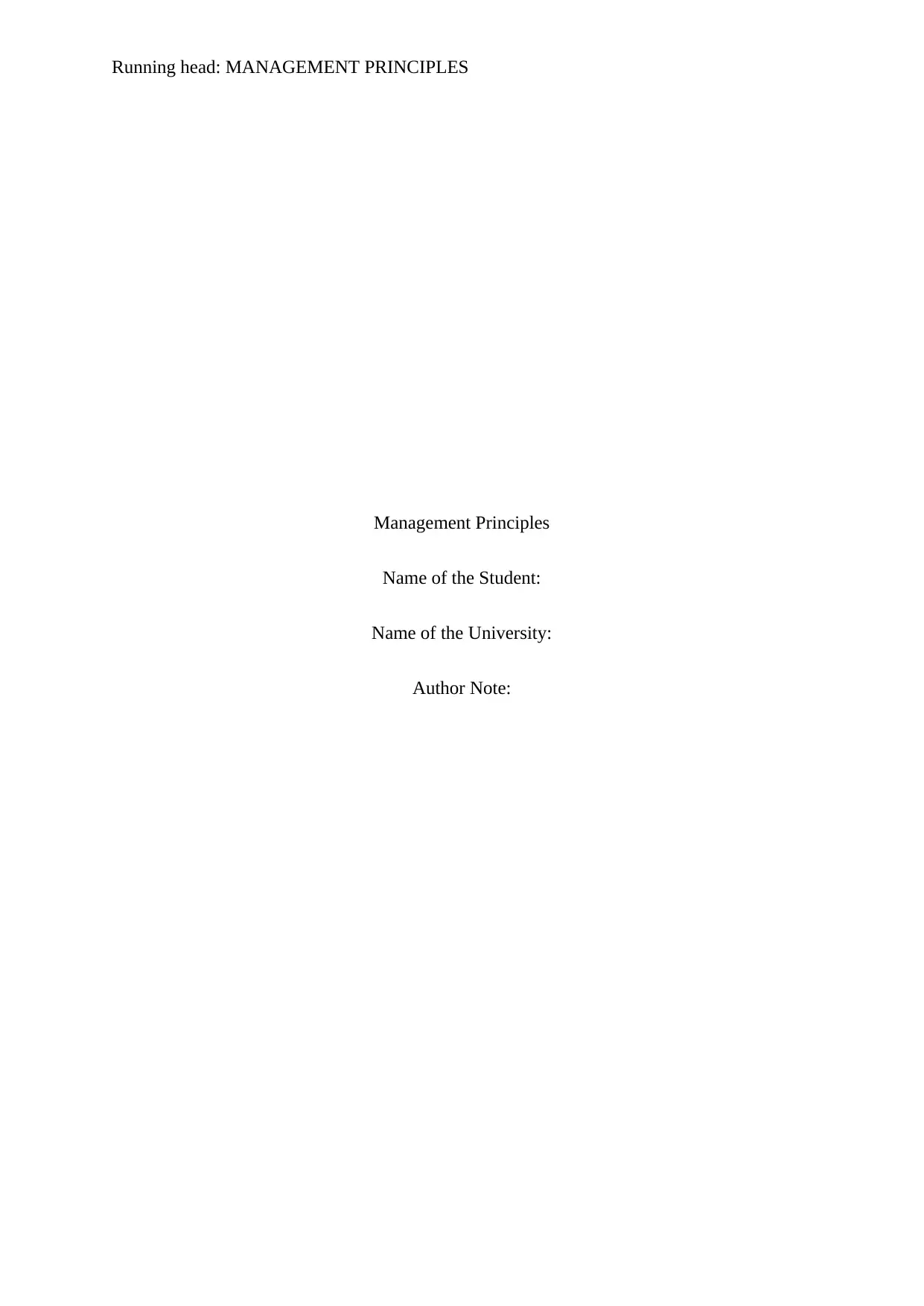
Running head: MANAGEMENT PRINCIPLES
Management Principles
Name of the Student:
Name of the University:
Author Note:
Management Principles
Name of the Student:
Name of the University:
Author Note:
Paraphrase This Document
Need a fresh take? Get an instant paraphrase of this document with our AI Paraphraser
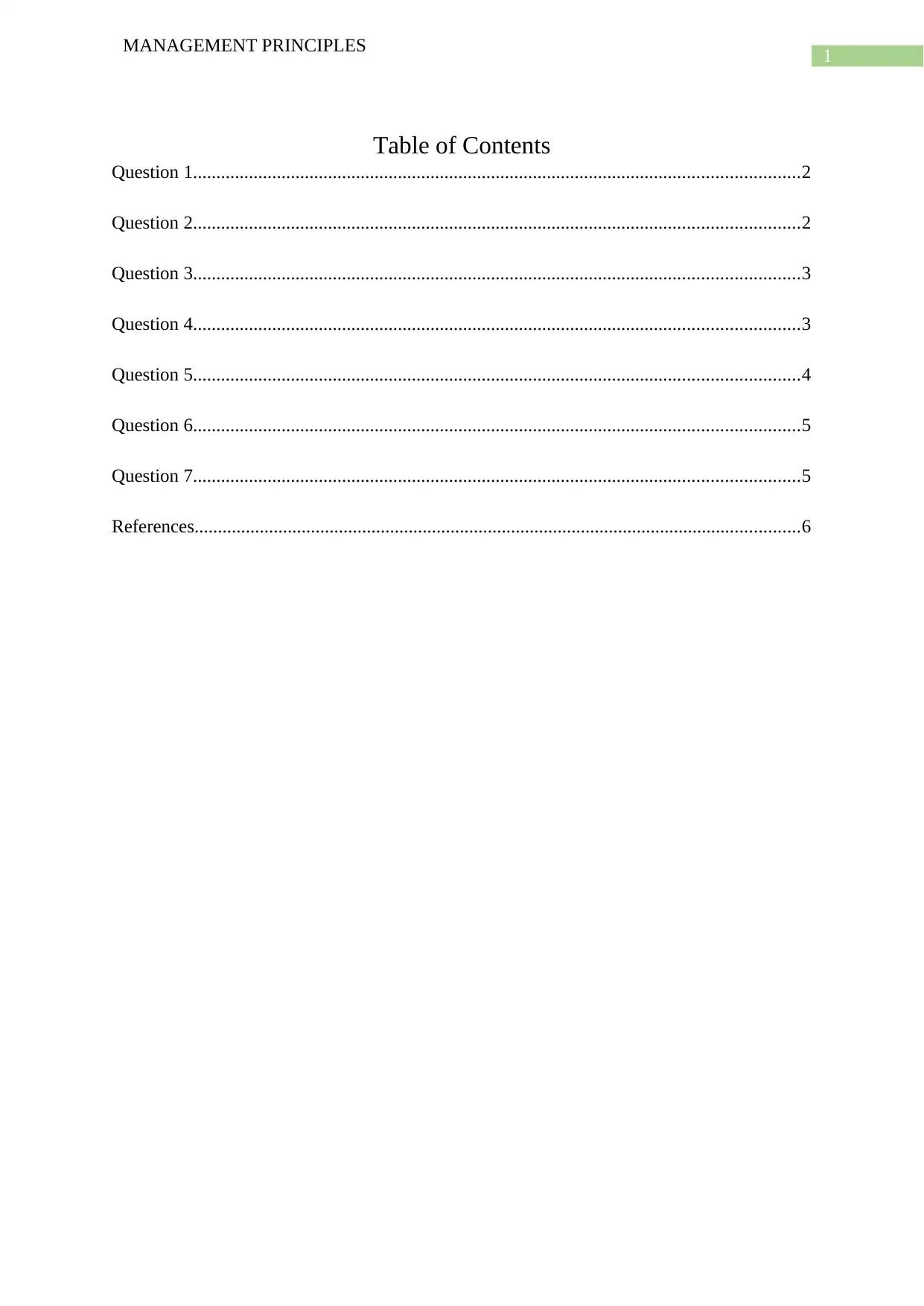
1
MANAGEMENT PRINCIPLES
Table of Contents
Question 1..................................................................................................................................2
Question 2..................................................................................................................................2
Question 3..................................................................................................................................3
Question 4..................................................................................................................................3
Question 5..................................................................................................................................4
Question 6..................................................................................................................................5
Question 7..................................................................................................................................5
References..................................................................................................................................6
MANAGEMENT PRINCIPLES
Table of Contents
Question 1..................................................................................................................................2
Question 2..................................................................................................................................2
Question 3..................................................................................................................................3
Question 4..................................................................................................................................3
Question 5..................................................................................................................................4
Question 6..................................................................................................................................5
Question 7..................................................................................................................................5
References..................................................................................................................................6
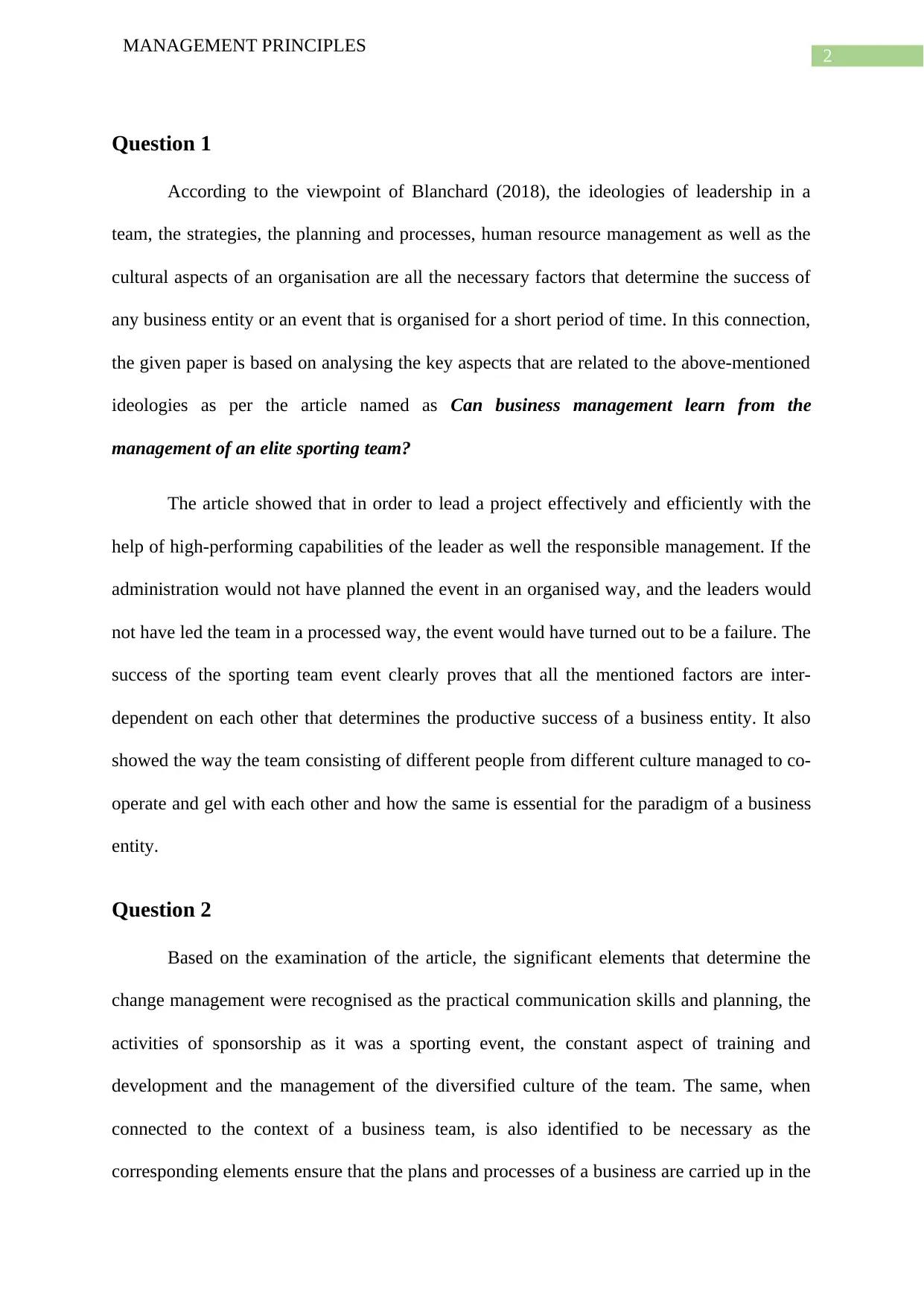
2
MANAGEMENT PRINCIPLES
Question 1
According to the viewpoint of Blanchard (2018), the ideologies of leadership in a
team, the strategies, the planning and processes, human resource management as well as the
cultural aspects of an organisation are all the necessary factors that determine the success of
any business entity or an event that is organised for a short period of time. In this connection,
the given paper is based on analysing the key aspects that are related to the above-mentioned
ideologies as per the article named as Can business management learn from the
management of an elite sporting team?
The article showed that in order to lead a project effectively and efficiently with the
help of high-performing capabilities of the leader as well the responsible management. If the
administration would not have planned the event in an organised way, and the leaders would
not have led the team in a processed way, the event would have turned out to be a failure. The
success of the sporting team event clearly proves that all the mentioned factors are inter-
dependent on each other that determines the productive success of a business entity. It also
showed the way the team consisting of different people from different culture managed to co-
operate and gel with each other and how the same is essential for the paradigm of a business
entity.
Question 2
Based on the examination of the article, the significant elements that determine the
change management were recognised as the practical communication skills and planning, the
activities of sponsorship as it was a sporting event, the constant aspect of training and
development and the management of the diversified culture of the team. The same, when
connected to the context of a business team, is also identified to be necessary as the
corresponding elements ensure that the plans and processes of a business are carried up in the
MANAGEMENT PRINCIPLES
Question 1
According to the viewpoint of Blanchard (2018), the ideologies of leadership in a
team, the strategies, the planning and processes, human resource management as well as the
cultural aspects of an organisation are all the necessary factors that determine the success of
any business entity or an event that is organised for a short period of time. In this connection,
the given paper is based on analysing the key aspects that are related to the above-mentioned
ideologies as per the article named as Can business management learn from the
management of an elite sporting team?
The article showed that in order to lead a project effectively and efficiently with the
help of high-performing capabilities of the leader as well the responsible management. If the
administration would not have planned the event in an organised way, and the leaders would
not have led the team in a processed way, the event would have turned out to be a failure. The
success of the sporting team event clearly proves that all the mentioned factors are inter-
dependent on each other that determines the productive success of a business entity. It also
showed the way the team consisting of different people from different culture managed to co-
operate and gel with each other and how the same is essential for the paradigm of a business
entity.
Question 2
Based on the examination of the article, the significant elements that determine the
change management were recognised as the practical communication skills and planning, the
activities of sponsorship as it was a sporting event, the constant aspect of training and
development and the management of the diversified culture of the team. The same, when
connected to the context of a business team, is also identified to be necessary as the
corresponding elements ensure that the plans and processes of a business are carried up in the
⊘ This is a preview!⊘
Do you want full access?
Subscribe today to unlock all pages.

Trusted by 1+ million students worldwide
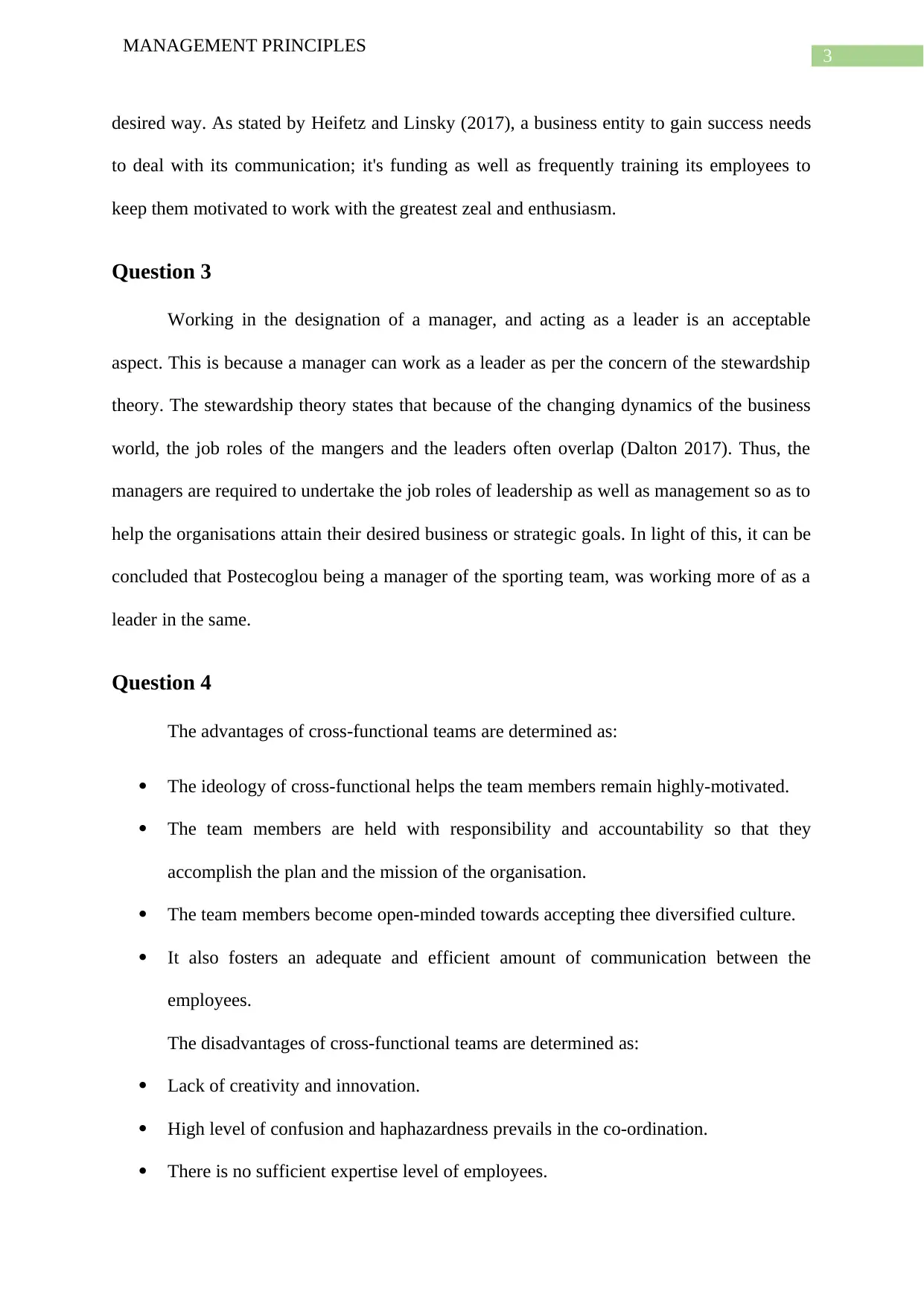
3
MANAGEMENT PRINCIPLES
desired way. As stated by Heifetz and Linsky (2017), a business entity to gain success needs
to deal with its communication; it's funding as well as frequently training its employees to
keep them motivated to work with the greatest zeal and enthusiasm.
Question 3
Working in the designation of a manager, and acting as a leader is an acceptable
aspect. This is because a manager can work as a leader as per the concern of the stewardship
theory. The stewardship theory states that because of the changing dynamics of the business
world, the job roles of the mangers and the leaders often overlap (Dalton 2017). Thus, the
managers are required to undertake the job roles of leadership as well as management so as to
help the organisations attain their desired business or strategic goals. In light of this, it can be
concluded that Postecoglou being a manager of the sporting team, was working more of as a
leader in the same.
Question 4
The advantages of cross-functional teams are determined as:
The ideology of cross-functional helps the team members remain highly-motivated.
The team members are held with responsibility and accountability so that they
accomplish the plan and the mission of the organisation.
The team members become open-minded towards accepting thee diversified culture.
It also fosters an adequate and efficient amount of communication between the
employees.
The disadvantages of cross-functional teams are determined as:
Lack of creativity and innovation.
High level of confusion and haphazardness prevails in the co-ordination.
There is no sufficient expertise level of employees.
MANAGEMENT PRINCIPLES
desired way. As stated by Heifetz and Linsky (2017), a business entity to gain success needs
to deal with its communication; it's funding as well as frequently training its employees to
keep them motivated to work with the greatest zeal and enthusiasm.
Question 3
Working in the designation of a manager, and acting as a leader is an acceptable
aspect. This is because a manager can work as a leader as per the concern of the stewardship
theory. The stewardship theory states that because of the changing dynamics of the business
world, the job roles of the mangers and the leaders often overlap (Dalton 2017). Thus, the
managers are required to undertake the job roles of leadership as well as management so as to
help the organisations attain their desired business or strategic goals. In light of this, it can be
concluded that Postecoglou being a manager of the sporting team, was working more of as a
leader in the same.
Question 4
The advantages of cross-functional teams are determined as:
The ideology of cross-functional helps the team members remain highly-motivated.
The team members are held with responsibility and accountability so that they
accomplish the plan and the mission of the organisation.
The team members become open-minded towards accepting thee diversified culture.
It also fosters an adequate and efficient amount of communication between the
employees.
The disadvantages of cross-functional teams are determined as:
Lack of creativity and innovation.
High level of confusion and haphazardness prevails in the co-ordination.
There is no sufficient expertise level of employees.
Paraphrase This Document
Need a fresh take? Get an instant paraphrase of this document with our AI Paraphraser
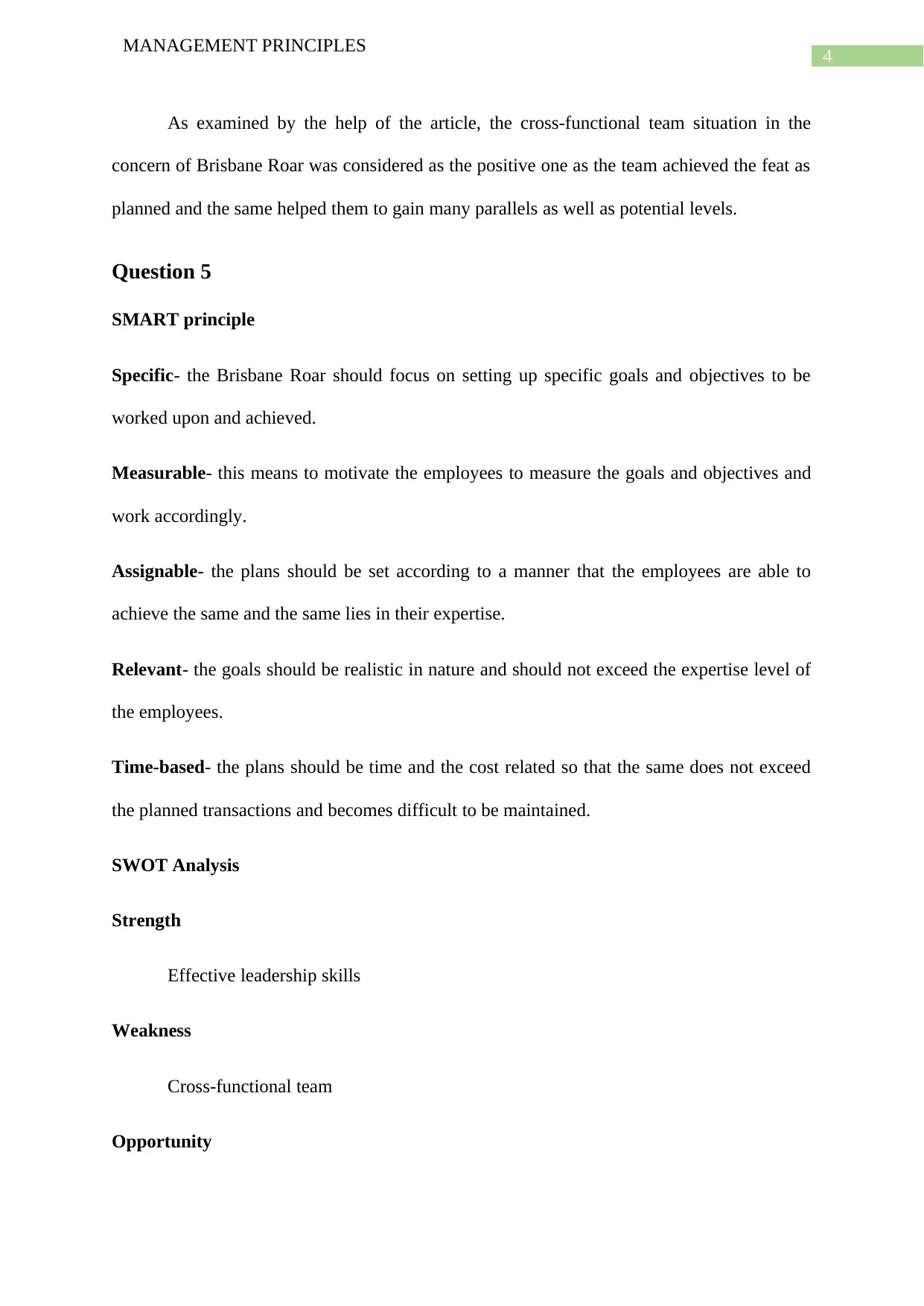
4
MANAGEMENT PRINCIPLES
As examined by the help of the article, the cross-functional team situation in the
concern of Brisbane Roar was considered as the positive one as the team achieved the feat as
planned and the same helped them to gain many parallels as well as potential levels.
Question 5
SMART principle
Specific- the Brisbane Roar should focus on setting up specific goals and objectives to be
worked upon and achieved.
Measurable- this means to motivate the employees to measure the goals and objectives and
work accordingly.
Assignable- the plans should be set according to a manner that the employees are able to
achieve the same and the same lies in their expertise.
Relevant- the goals should be realistic in nature and should not exceed the expertise level of
the employees.
Time-based- the plans should be time and the cost related so that the same does not exceed
the planned transactions and becomes difficult to be maintained.
SWOT Analysis
Strength
Effective leadership skills
Weakness
Cross-functional team
Opportunity
MANAGEMENT PRINCIPLES
As examined by the help of the article, the cross-functional team situation in the
concern of Brisbane Roar was considered as the positive one as the team achieved the feat as
planned and the same helped them to gain many parallels as well as potential levels.
Question 5
SMART principle
Specific- the Brisbane Roar should focus on setting up specific goals and objectives to be
worked upon and achieved.
Measurable- this means to motivate the employees to measure the goals and objectives and
work accordingly.
Assignable- the plans should be set according to a manner that the employees are able to
achieve the same and the same lies in their expertise.
Relevant- the goals should be realistic in nature and should not exceed the expertise level of
the employees.
Time-based- the plans should be time and the cost related so that the same does not exceed
the planned transactions and becomes difficult to be maintained.
SWOT Analysis
Strength
Effective leadership skills
Weakness
Cross-functional team
Opportunity
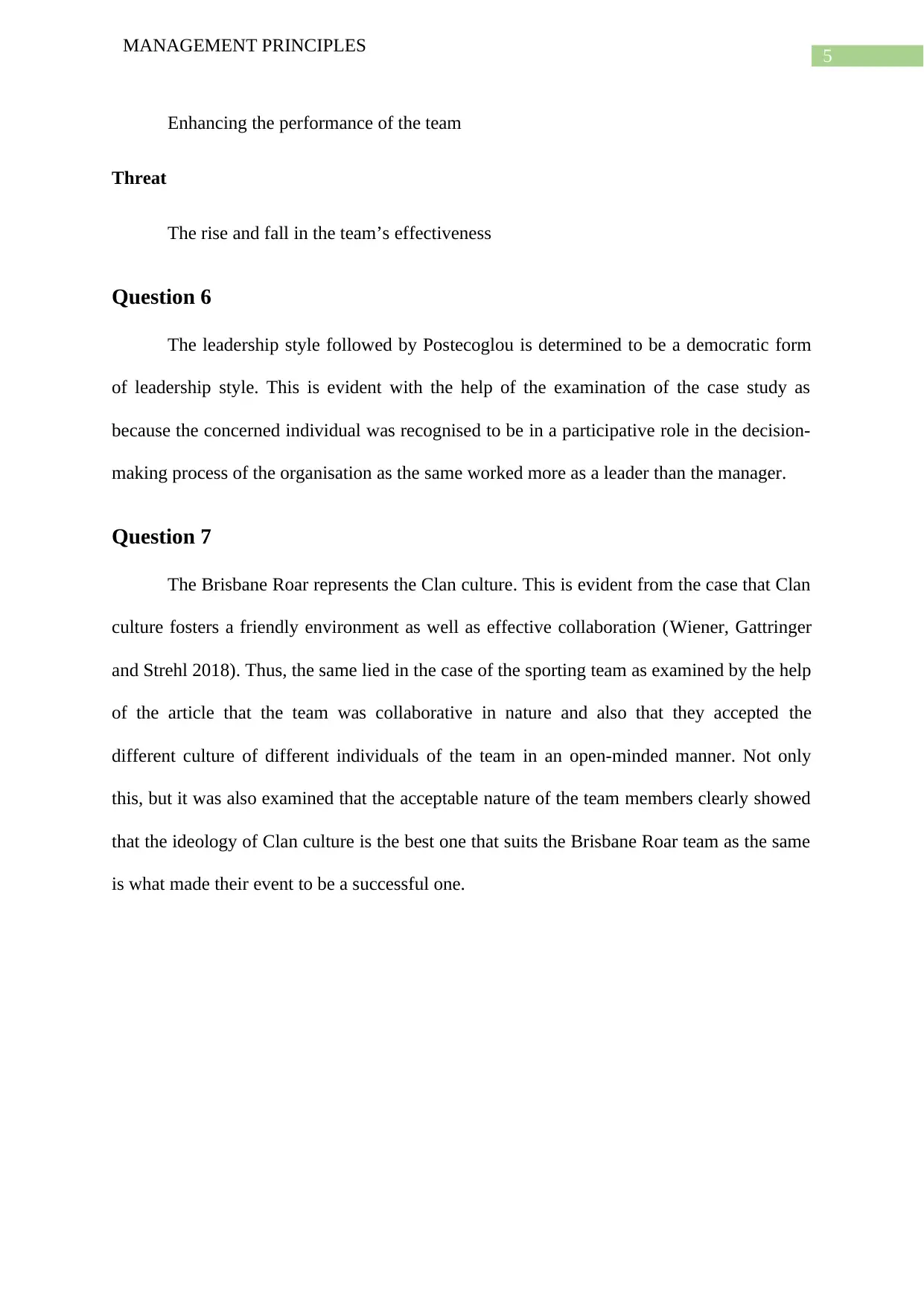
5
MANAGEMENT PRINCIPLES
Enhancing the performance of the team
Threat
The rise and fall in the team’s effectiveness
Question 6
The leadership style followed by Postecoglou is determined to be a democratic form
of leadership style. This is evident with the help of the examination of the case study as
because the concerned individual was recognised to be in a participative role in the decision-
making process of the organisation as the same worked more as a leader than the manager.
Question 7
The Brisbane Roar represents the Clan culture. This is evident from the case that Clan
culture fosters a friendly environment as well as effective collaboration (Wiener, Gattringer
and Strehl 2018). Thus, the same lied in the case of the sporting team as examined by the help
of the article that the team was collaborative in nature and also that they accepted the
different culture of different individuals of the team in an open-minded manner. Not only
this, but it was also examined that the acceptable nature of the team members clearly showed
that the ideology of Clan culture is the best one that suits the Brisbane Roar team as the same
is what made their event to be a successful one.
MANAGEMENT PRINCIPLES
Enhancing the performance of the team
Threat
The rise and fall in the team’s effectiveness
Question 6
The leadership style followed by Postecoglou is determined to be a democratic form
of leadership style. This is evident with the help of the examination of the case study as
because the concerned individual was recognised to be in a participative role in the decision-
making process of the organisation as the same worked more as a leader than the manager.
Question 7
The Brisbane Roar represents the Clan culture. This is evident from the case that Clan
culture fosters a friendly environment as well as effective collaboration (Wiener, Gattringer
and Strehl 2018). Thus, the same lied in the case of the sporting team as examined by the help
of the article that the team was collaborative in nature and also that they accepted the
different culture of different individuals of the team in an open-minded manner. Not only
this, but it was also examined that the acceptable nature of the team members clearly showed
that the ideology of Clan culture is the best one that suits the Brisbane Roar team as the same
is what made their event to be a successful one.
⊘ This is a preview!⊘
Do you want full access?
Subscribe today to unlock all pages.

Trusted by 1+ million students worldwide
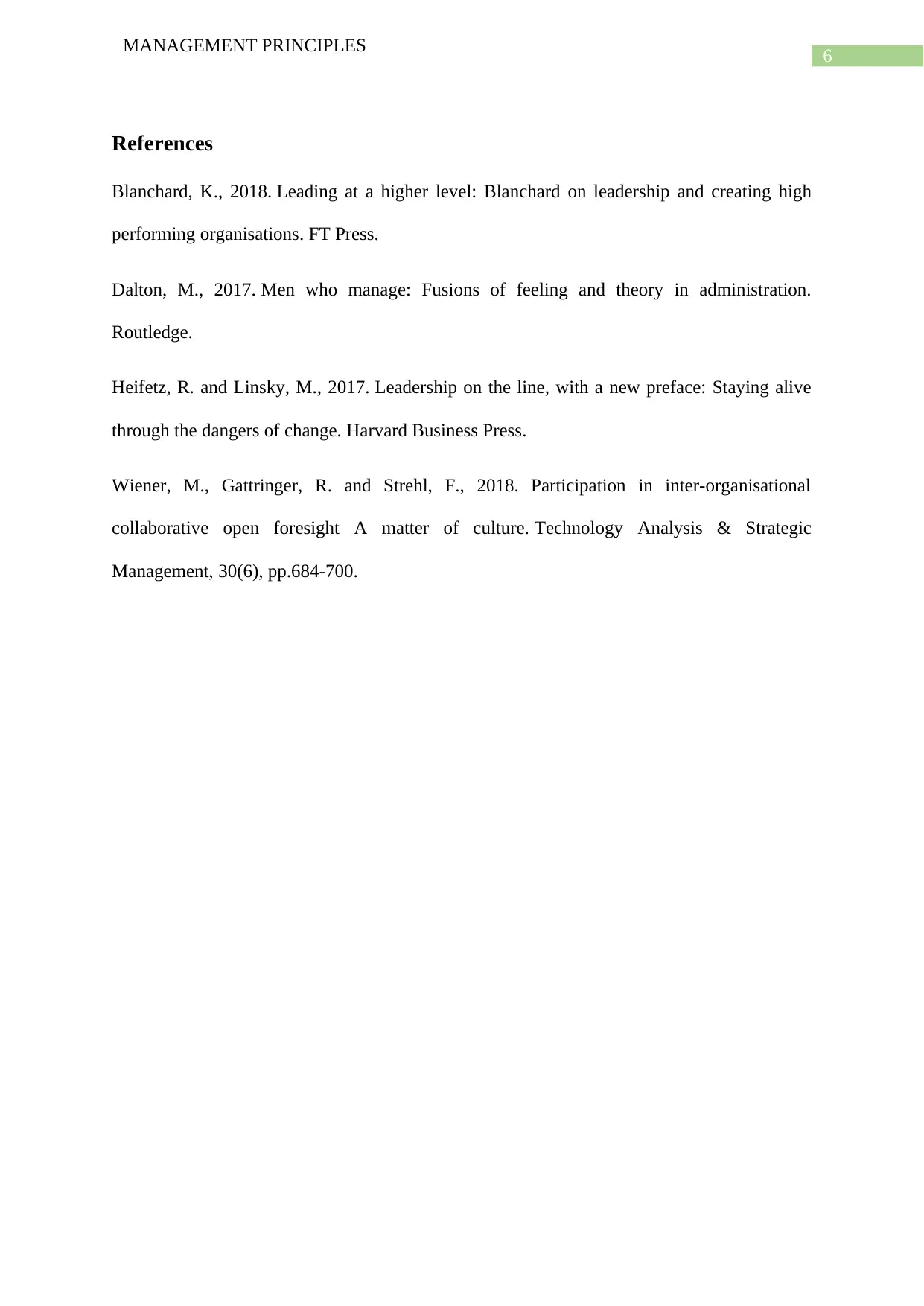
6
MANAGEMENT PRINCIPLES
References
Blanchard, K., 2018. Leading at a higher level: Blanchard on leadership and creating high
performing organisations. FT Press.
Dalton, M., 2017. Men who manage: Fusions of feeling and theory in administration.
Routledge.
Heifetz, R. and Linsky, M., 2017. Leadership on the line, with a new preface: Staying alive
through the dangers of change. Harvard Business Press.
Wiener, M., Gattringer, R. and Strehl, F., 2018. Participation in inter-organisational
collaborative open foresight A matter of culture. Technology Analysis & Strategic
Management, 30(6), pp.684-700.
MANAGEMENT PRINCIPLES
References
Blanchard, K., 2018. Leading at a higher level: Blanchard on leadership and creating high
performing organisations. FT Press.
Dalton, M., 2017. Men who manage: Fusions of feeling and theory in administration.
Routledge.
Heifetz, R. and Linsky, M., 2017. Leadership on the line, with a new preface: Staying alive
through the dangers of change. Harvard Business Press.
Wiener, M., Gattringer, R. and Strehl, F., 2018. Participation in inter-organisational
collaborative open foresight A matter of culture. Technology Analysis & Strategic
Management, 30(6), pp.684-700.
1 out of 7
Related Documents
Your All-in-One AI-Powered Toolkit for Academic Success.
+13062052269
info@desklib.com
Available 24*7 on WhatsApp / Email
![[object Object]](/_next/static/media/star-bottom.7253800d.svg)
Unlock your academic potential
Copyright © 2020–2025 A2Z Services. All Rights Reserved. Developed and managed by ZUCOL.





